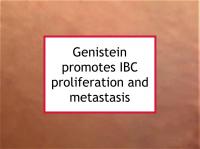Women with inflammatory breast cancer (IBC) typically present with a short history of significant breast enlargement and redness of the skin. Other possible symptoms include breast or underarm pain, a sensation of heat in the breast, skin ridging, and an orange peel-like appearance of the overlying skin.
Time is of the essence in this type of breast cancer—treatment should be undertaken by an experienced medical team and should be swift and aggressive. While the prognosis for IBC patients can be unfavorable, survival rates have shown some improvement over time. Because IBC is so rare, no population studies have investigated the associations between IBC and consumption of specific foods. However, there have been a few laboratory studies that have evaluated the impact of food or food extracts on IBC. For example, cruciferous vegetables, green tea and reishi mushroom have been reported to inhibit the growth or progression of IBC. On the other hand, copper- and aluminum-containing foods, cookware, jewelry and personal care products probably should be avoided.
Now a new study has reported that the soy isoflavone genistein increases proliferation and metastasis in an animal model of IBC.
Genistein promotes IBC inflammation & metastasis
The study referenced above was designed to investigate the effects of genistein in an animal model of IBC. The structural similarity of genistein to estrogen allows it to bind at the cellular level with estrogen receptors. To conduct the study, the authors used a canine inflammatory mammary cancer (canine IC) xenograft model. Canine IC was grafted into mice. Note that canine IC has been found to serve as a suitable model for human IBC. The effects of genistein intake on the cancer xenografts were assessed for three weeks.
Mice given genistein as part of their diets were found to have higher tumor proliferation (as measured by Ki-67) than a control group of mice that did not receive genistein. In addition, the genistein group experienced significantly higher numbers of distant metastases compared to the control group. Tumor and circulating levels of progesterone, androstenedione and estrogen all were higher in the genistein-treated mice.
The authors conclude that intake of genistein promoted tumor proliferation and elevated metastatic rates by increasing estrogen levels in this animal model of IBC.
Please see our article on IBC and diet for more information.
